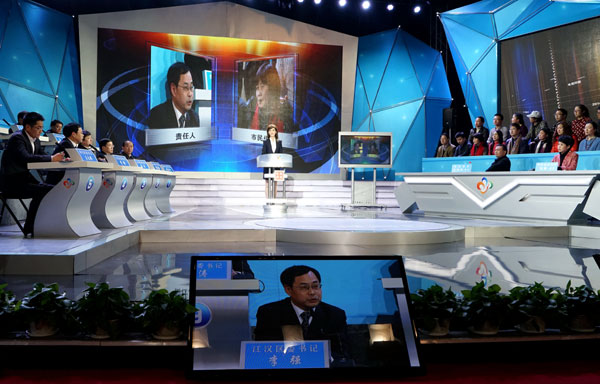TV program channels public debate
By He Na and Zhou Lihua (China Daily) Updated: 2015-02-02 07:48
 |
|
Dianshi Wenzheng, or Questioning Officials On TV has become the most popular show in Wuhan, Hubei province. The show features officials giving immediate reactions to public questions and criticism. Chen Jianhua / Provided to China Daily |
The camera focuses on an office with an en suite bedroom. Dozens of colored bags are piled on the floor. The lens zooms in, picking out numerous cartons of high-end cigarettes, tea, a range of snacks and other foods, and various bottles of expensive alcohol.
If the sign on the door didn't show that this is the office of the director of the Jianghan District Health and Family Planning Commission in Wuhan, the capital of Hubei province, you might think the place was a storeroom for gifts.
That scene was part of a filmed tape broadcast on live television on Jan 6. Several high-ranking officials, including Li Qiang, the Party chief of Jianghan district, were in the studio for the broadcast on a program called Dianshi Wenzheng, or Questioning Officials on TV.
The officials sat stage left, while deputies of the city and district people's congresses, media representatives, and local residents sat on the right.
"Did you know your subordinate was so unrestrained?" a member of the media asked Li. "Unrestrained" is a popular term on the Internet as a way of describing people who follow desires, not rules.
The question prompted a huge laugh from the audience, but Li was grave, and sat stony-faced. "I didn't know about this. Really. I'm shocked and upset. If these gifts are actually bribes, we'll give the public a satisfactory answer," he said, looking a little awkward.
Reality and awkwardness
Scenes such as this have been common in recent years. The program's mix of reality, a firm line in questioning, and the awkward performances of a number of officials have resulted in Dianshi Wenzheng, made by Wuhan Television Station, or WHTV, becoming the most popular show in the city. The audience has even given it a nickname: "Do it immediately".
Dianshi Wenzheng, which started in November 2011, was China's first live TV forum dedicated to the public questioning of officials. The show was supported by Wuhan's Party chief Ruan Chengfa, and was seen as a way to promote a change of working style for officials, and help them understand their responsibilities.
So far, the program has gone out 30 times, and has featured question and answer sessions with almost every head of a local government department, including several members of the Standing Committee of the Wuhan Party Committee.
Every January, the local government collects a list of problems from the public, and then selects the 10 that have raised the greatest public concern. The government departments charged with dealing with the related services are then required to make a public pledge to solve the problems.
"The program is our mid-term and final exams for officials. The heads of different departments are invited into the hot seat to explain why they failed to solve the problems as promised," Che Yan'gao, head of the Wuhan Discipline Inspection Commission, said.
Tension and anxiety
Huang Hongyun, vice-president of the Wuhan Academy of Social Sciences, said that initially the officials performed poorly in the spotlight. "Many sweated profusely, and said very little, They were nervous and kept apologizing because they didn't know about the problems. Meanwhile, the anchor and commentators interrupted the officials whenever they used excuses or tried to avoid accepting responsibility.
"In the early days, the atmosphere on the stage was very tense. Some officials were nervous, partly because they were unfamiliar with the problems under their management, while the citizens' representatives used the program as a place to vent their anger and dissatisfaction," said Huang, who has participated 15 times as a commentator.
"But in recent years, I've found that both officials and the audience have become more rational. The officials have learned a few skills to please the audience, but more important, many have accepted this new method of supervision, and have gradually changed their approaches and now work much harder. That means they are more confident when asked to respond to questions," she said.
Zuo Shaobin, director of the Wuhan Water Authority, appeared on the program in 2012 and made the first formal public apology for departmental shortcomings.
- Govt encourages people to work 4.5 days a week
- Action to be taken as HIV cases among students rise
- Debate grows over reproductive rights
- Country's first bishop ordained in 3 years
- China builds Tibetan Buddhism academy in Chengdu
- Authorities require reporting of HIV infections at schools
- Typhoon Soudelor kills 14 in East China
- Police crack down on overseas gambling site
- Debate over death penalty for child traffickers goes on
- Beijing to tighten mail security for war anniversary







